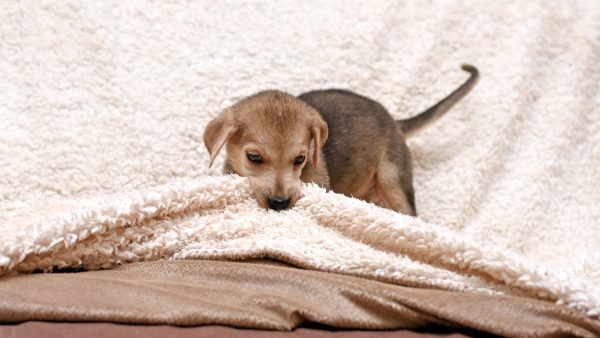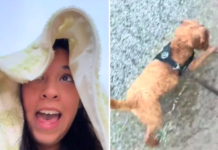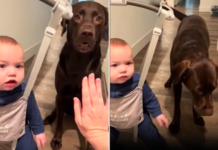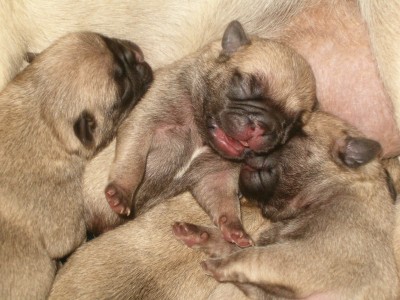Last Updated on October 24, 2023 by Fumipets
Why Do Dogs Nibble on Blankets? 6 Reasons for this behavior
Blanket nibbling is a peculiar yet common behavior observed in many dogs. This article delves into the reasons behind this habit, shedding light on the possible motivations behind this seemingly strange canine behavior.
1. Stress Relief and Comfort
Blanket nibbling is often a way for dogs to self-soothe and relieve stress or anxiety. Similar to how humans may fidget or chew on objects when nervous, dogs may turn to blanket nibbling for comfort.
2. Teething and Dental Health
Puppies, in particular, may nibble on blankets as a way to ease the discomfort of teething. Chewing on soft fabric can provide relief and help in the process of new teeth emerging. It also promotes dental health by helping to remove plaque and tartar.
3. Scent and Familiarity
Dogs have a keen sense of smell, and they often transfer their scent onto items they frequently interact with, including blankets. This scent-marking behavior helps them feel secure and reinforces their connection with the blanket.
4. Boredom and Lack of Stimulation
Dogs that lack mental and physical stimulation may resort to blanket nibbling out of sheer boredom. Providing engaging toys, exercise, and interaction can help reduce this behavior.
5. Mimicking Mother Dogs
For puppies separated from their mother too early, blanket nibbling may be a way of mimicking their mother’s presence and the comforting feeling of nursing.
Dogs Nibble on Blankets
Many dogs gnaw on blankets, which leaves their owners perplexed as to why. They chew on things other than simply their blankets. Any stray blanket attracts attention. Your task is to determine which of the many possible reasons is driving your dog’s behavior.
Dogs have a natural need to chew. Any dog breed may engage in excessive chewing, but those that hunt, herd, or protect are more likely to do so. Dogs will sometimes chew when they are angry, anxious, or just hungry. One of the most favored things to chew on is a blanket. The majority of the time, chewing on a blanket is a completely normal activity.
The six distinct reasons dogs gnaw on blankets are listed here, along with some suggestions for changing the behavior.
6 Reasons Dogs Nibble on Blankets

1. It provides entertainment
For dogs, biting, nipping, and nibbling are normal behaviors. Puppy play involves biting and nibbling, as you can see if you observe a litter of pups interact with one another. The other puppy will yell to warn them if they bite down too hard while playing. Additionally, this is how newborn pups acquire the crucial life skill of biting restraint.
While some dogs stop chewing as puppies, others continue to do so as adults. Due to their innate hunting impulses, hunting dogs like dachshunds, pointers, and spaniels are more prone to gnaw on blankets well into maturity. Tiny dogs do chew, but large dogs are more likely to engage in destructive gnawing than small dogs. Because they may inflict more harm, owners just pay more attention when huge dogs chew.
Any dog that nibbles may start to chew. It’s a behavior that rewards oneself. Your dog will continue to chew on blankets if he realizes that it is enjoyable to do so.
Additionally, it may be a pleasant and peaceful exercise that aids in their settling down. Particularly with high-energy breeds like border collies or German shepherds that struggle to locate an “off button,” many owners actually use this trait to train their dogs to calm. The hitch is that your dog has to understand what is and isn’t appropriate to chew on. If not, you can catch him nipping your arm to try to relax.
2. Your dog is hungry
Dogs may sometimes chew on non-food things when their diet is lacking in calories and nutrients. Even though it seems that your dog is eating well, there is a chance that not all of his requirements are being met by his food. Additionally, a change in feces, hair loss, and poor energy are signs of nutritional inadequacy.
In order to keep your dog’s energy levels up, it’s crucial to make sure his daily calorie needs are satisfied. Your dog may not be receiving enough calories in his food if you notice he is less energetic, less interested in activities, or spends a lot of time laying about.
Make sure your dog’s food is carefully chosen and has all the nutrients your dog needs to be healthy. It is simple to ensure that he is receiving nutritious meals by looking at the ingredient list. Make sure your dog food complies with the requirements established by the Association of American Feed Control Officials as a simple rule of thumb. If so, it satisfies all of your dog’s nutritional needs for the day.
3. Your dog is bored
Dogs that are left alone for extended periods of time sometimes get bored. Unwanted behavior, which may range from gnawing on furniture to incessant barking to outright damage, is often influenced by boredom.
Making sure your dog has enough exercise and attention before you leave for the day is an excellent method to stop your dog from chewing on blankets out of boredom. When it’s feasible, ask someone to take your dog for a lunchtime stroll. If you can’t do this, be sure to exercise or run your dog when you arrive home so he can release any excess energy.
Dogs prefer regular constancy, but they also enjoy exploring and having new experiences. A little amount of routine variation might sometimes help to alleviate your dog’s ennui. Try a different dog park, a different walking path, or a swim with him. He could like the tempo difference.
Your dog won’t be able to tell what is appropriate to chew on when he is left alone at home. You must demonstrate to him what is proper. To achieve this, make sure your dog has access to a wide variety of toys and chews. Use a chew deterrent spray, such as bitter apple, to ensure your dog doesn’t enjoy chewing on any items you wish to keep absolutely off-limits while you’re not around.

4. Your dog is stressed
Dogs feel stress the same way humans do. They may experience stress due to relocation, unfamiliar settings, loud sounds, or being left alone at home. All dogs sense stress under certain circumstances, while some are more prone to stress and anxiety than others.
Pacing, continual yawning or licking, a reduced appetite, howling, whimpering, or an increase in sleep are all indications that your dog is agitated.
Your dog may use chewing on blankets as a stress reliever. Your dog learns that chewing a blanket helps him feel better, much as a comfort item used as a youngster, therefore he will utilize this activity whenever he is feeling worried.
It’s important to be patient with your dog if he’s anxious because of a relocation or because he’s new to the family. Be patient and provide him with suitable items to gnaw on. After a few weeks, the majority of dogs will adjust to their new environment and return to normal. Consult a dog trainer for advice on how to assist your dog gradually getting used to being alone if they are experiencing separation anxiety.
5. Your dog is in pain
Pain is often a transient problem. When teething, puppies will chew on anything and everything to relieve the discomfort in their mouths. Offering frozen chew toys or a damp facecloth to chew on might reduce this discomfort.
Some dogs that have allergies also itch and gnaw on blankets to get some relief. Similar to how it might make your dog nip at a blanket to feel better after an injury.
The habit of your dog nibbling may often be stopped by identifying the cause of the discomfort and treating it.
6. Premature weaning
A frequent cause of dogs sucking or nibbling on blankets is because they were weaned from their moms too soon. For at least eight weeks after birth, puppies should stay with their moms, but this doesn’t often happen for a variety of reasons. This doesn’t always happen for the owners’ fault; sometimes, it occurs for no reason at all.
Nevertheless, pups that were weaned too early may have certain behavioral issues. They won’t hurt your dog, and with a little more work, you can train them in a way that your puppy’s mother was unable to.
In the instance of blanket nibbling, puppies naturally suckle their mothers; thus, when the mother is absent, they look for another object to suckle on. The next best thing is frequently a cozy blanket.

Is Blanket Nibbling Harmful to My Dog?
Your dog won’t be hurt by nibbling on a blanket, sorry. It’s usually better to confine the activity to a single blanket that belongs to your dog if your dog’s blanket nibbling disturbs you. Your dog will quickly become used to just nibbling on “his blanket” and not yours.
If it is an anxiety or pain reaction, there is an exception to this rule. If your dog exhibits this behavior, you must first deal with the underlying root of the problem.
How Do I Stop My Dog’s Blanket Nibbling Behavior?
As previously said, it is ideal to guide chewing action toward a more suitable item. Often, the issue may be resolved by giving your dog his own blanket or multiple chew toys that he is permitted to gnaw on.
Unwanted chewing may be stopped by spending some time instructing your dog about what he can and cannot chew on. Teach the words “NO” and “STOP” to your dog. When he is chewing on something that he shouldn’t, offer him something that is appropriate for him to chew on and issue the instruction. When your dog chews on his own belongings, be sure to praise and reward him often.
Conclusion
Dogs gnaw on blankets for a number of reasons, but most often they do it for comfort, to satiate their chewing urges, or just to pass the time. Dogs may also nip when they’re anxious, lonely, or hurt. Knowing the warning indicators to watch for will help you identify the cause of your dog’s blanket-nibbling habit and decide if you need to take any further steps to put a stop to it.
https://www.youtube.com/watch?v=6hY5Tu_lRI8
5 FAQs About Blanket Nibbling in Dogs
Is blanket nibbling harmful to dogs?
In moderation, blanket nibbling is generally harmless. However, excessive nibbling can damage the blanket or pose a risk if the dog ingests fabric.
How can I prevent my dog from nibbling on blankets?
To discourage blanket nibbling, provide appropriate chew toys, engage in interactive play, and address any underlying stress or anxiety issues.
When should I be concerned about my dog’s blanket nibbling?
If the behavior becomes obsessive, leads to fabric ingestion, or is accompanied by other concerning symptoms, it’s advisable to consult a veterinarian.
Are there specific breeds more prone to blanket nibbling?
Blanket nibbling can occur in dogs of any breed, but it may be more common in puppies and dogs with high energy levels.
Can blanket nibbling be a sign of an underlying health issue?
While blanket nibbling is often a behavioral quirk, it can sometimes indicate dental problems or digestive issues. If you’re concerned, consult with your vet.
Understanding why dogs nibble on blankets can help pet owners address the root causes and ensure their furry companions are happy, healthy, and comforted.


















